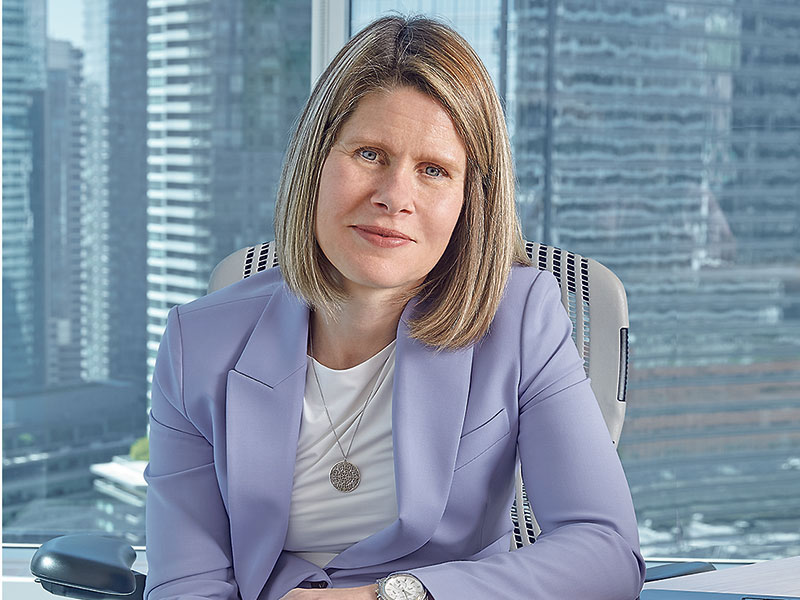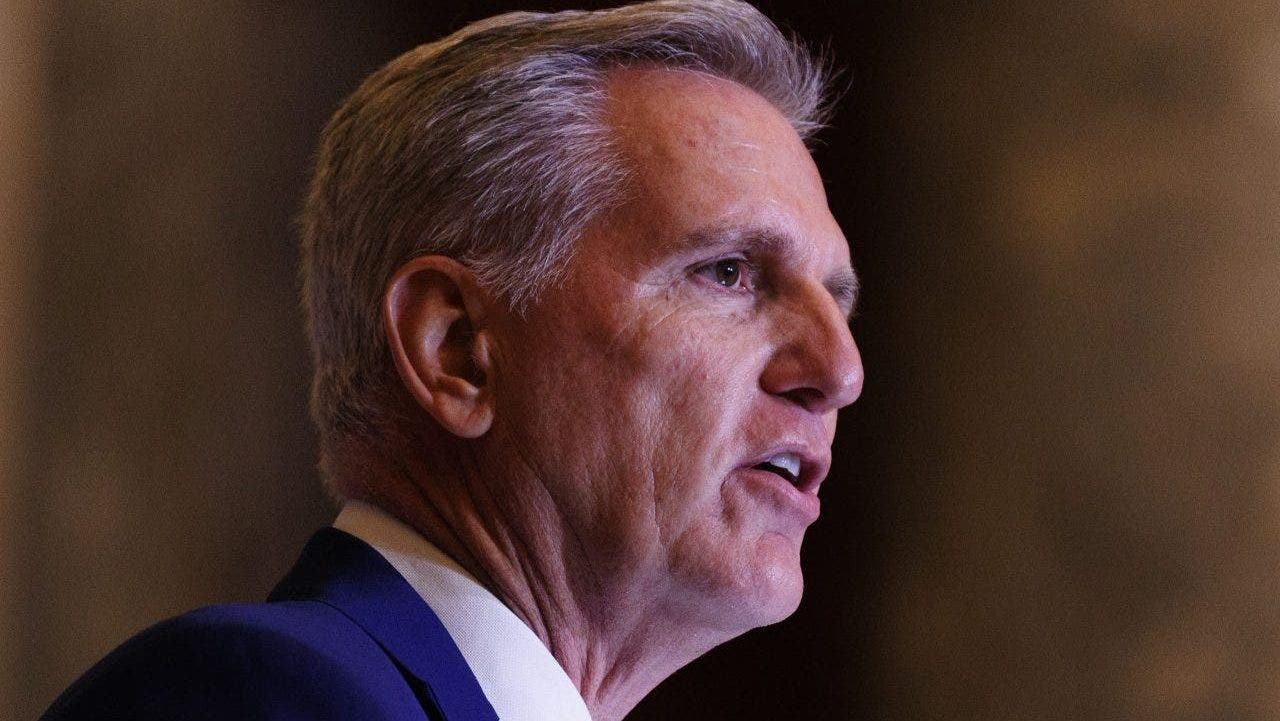“I had a conversation with a woman … in the finance sector who is a managing director at one organization, running a desk,” van Biesen said. “Her husband is a director, which is lower, at another organization, not running a desk. Same business. And he’s paid more than she is.”
The ongoing pay disparity is depressing, but van Biesen, who in January was appointed president and CEO of what was formerly known as Women in Capital Markets, focuses on possibility.
“I am in this role because I am an optimistic person,” she said. “And I do believe in the power of this sector to make change.”
Furthermore, the financial services sector has a “tremendous opportunity” to enact change, she said, “because we see this huge wealth shift” toward women, given factors such as longevity and divorce.
Van Biesen brings plenty of relevant experience as Women in Capital Markets rebrands to VersaFi and continues promoting inclusion in the finance sector. Before joining the organization, she was managing partner, board and CEO succession, with global consultancy Korn Ferry, where she advised on leadership decisions and advocated for inclusion.
Prior to that, she served in executive roles in both the Canadian and global arms of Catalyst, a non-profit focused on the advancement of women and underrepresented groups in the workplace. And a decade and a half ago, she established the diversity practice for global leadership consultancy Spencer Stuart’s Canadian financial services practice, with a focus on women on boards.
“I do this work because the finance sector is critical to this economy,” van Biesen said. “I want to see women fully represented in the most critical part of our economy, because that’s where all the important decisions are being made.”
Securing the corporate ladder
Representation requires a strong pipeline of talent, and women have increasingly entered the sector. “The intake valve — we’ve really addressed that,” van Biesen said, noting that institutions now hire female graduates as often as they do male. On this front, VersaFi’s offerings include skills building; professional development programming, including for students; coaching and mentoring; and networking.
In addition to acquiring skills, van Biesen suggests women surround themselves with the right people: “Seek out great organizations, great mentors, great sponsors and, to the extent that you can, great bosses.”
She also encourages risk-taking as a path to growth. When women mistakenly assess themselves as underqualified, “we’re doing ourselves a disservice,” she said.
But women doing their part to be great hires is only one part of the equation. Organizations must create a system that supports women’s growth and development, van Biesen said: “Too often, we see women who are put into situations that we affectionately call the glass cliff” — a do-or-die job without the support to succeed.
An organization that supports success, she said, systemically accommodates career breaks for caregiving, which many women will require at some point. It’s also transparent about pay and creates gender-balanced teams, which signal to women — both financial advisors and clients — that the firm values the richness that results from diversity of talent, she said: “There are a lot of these interventions that we can look at.”
However, she said persistence is key in addressing gender and pay disparities because “the minute you take your eye off that ball, you’re going to roll backwards.”
Fixing the broken rung
VersaFi aims to address what’s been coined “the broken rung”: after seven to 10 years of career success, women begin leaving at a disproportionately higher rate than men. And when women don’t advance mid-career, they don’t reach the top of the ladder. “We are stalled in progress at the executive level,” van Biesen said.
She made clear that women don’t leave simply because they’re starting families, but because they don’t feel valued at this stage of their careers. They may see no advancement opportunities, or believe taking leave will mean losing clients. “If we could take a marathon view versus a sprint view, and create … bridges so that we can smooth these things out, we would make huge progress,” she said. For example, a team approach to advising clients allows clients to feel connected to more than one team member, she said.
Cultural challenges must also be addressed, van Biesen said: “There’s a lot of still inappropriate exclusionary behaviour that happens in the brokerage business, in the advisory business … that we’re not addressing.” For example, traditional ways of entertaining clients — sports events on weekends, say — don’t create opportunity to “bring more people into the fold.”
Women clients can similarly feel like outsiders whose concerns won’t be acknowledged or addressed. Once, when van Biesen found herself listening to an investment pitch as she and her husband sat across the table from an all-male advisory team, she thought, “I’m not buying.”
But her optimism persists: “Canadian financial services is innovative and can make change and address these issues.”
For example, large firms are improving their parental leave policies and programs, she noted, with 25 having signed VersaFi’s Parental Leave Pledge as of March 27. The pledge includes promising to provide paid leave, communicating leave policies clearly and analyzing leave-related data.
“In wealth advisory, they’re trying to take a hard look at how they can create these on- and off-ramps for their women wealth advisors,” she said. “That takes really intentional leadership from management.”
Industry firms that have signed the pledge include Aviso Wealth Inc., Canaccord Genuity Corp., Desjardins Group, IG Wealth Management, Investment Planning Counsel, Manulife Financial Corp., Raymond James Ltd. and Bank of Nova Scotia.
Leading the climb
Innovation is also afoot at VersaFi, which rebranded on June 4.
“The industry has changed a lot since 1995,” when the organization was founded, van Biesen said. “This name [VersaFi] is a reflection of the diversity and the dynamism of the industry and the women within it.”
While the organization always represented women of diverse backgrounds, “we are going to be much more clear about that going forward,” she said.
VersaFi will “support and advocate for women and gender-diverse individuals in finance from all backgrounds,” a release said, and will focus on the buy side, sell side and fintech.
Van Biesen said her vision is to “be a much bigger voice in the equity conversation in the finance sector across the country.” That means talking about the broken rung phenomenon, bringing more research to the conversation, and ensuring leaders and organizations walk their talk, she said.
She tells the story of a financial services professional — a woman — in the throes of a stressful workday. It’s the kind of day when you feel as though you’re failing at the job, failing at your personal life and may as well throw in the towel.
But the boss says it’s going to be OK; that this too will pass. He wants you to stay, he says, because you have a great future.
“This is leadership,” van Biesen said. “Diversity, inclusion, equity — we call it all these things. But it is fundamentally about good leadership.”
This article appears in the June issue of Investment Executive. Subscribe to the print edition, read the digital edition or read the articles online.































